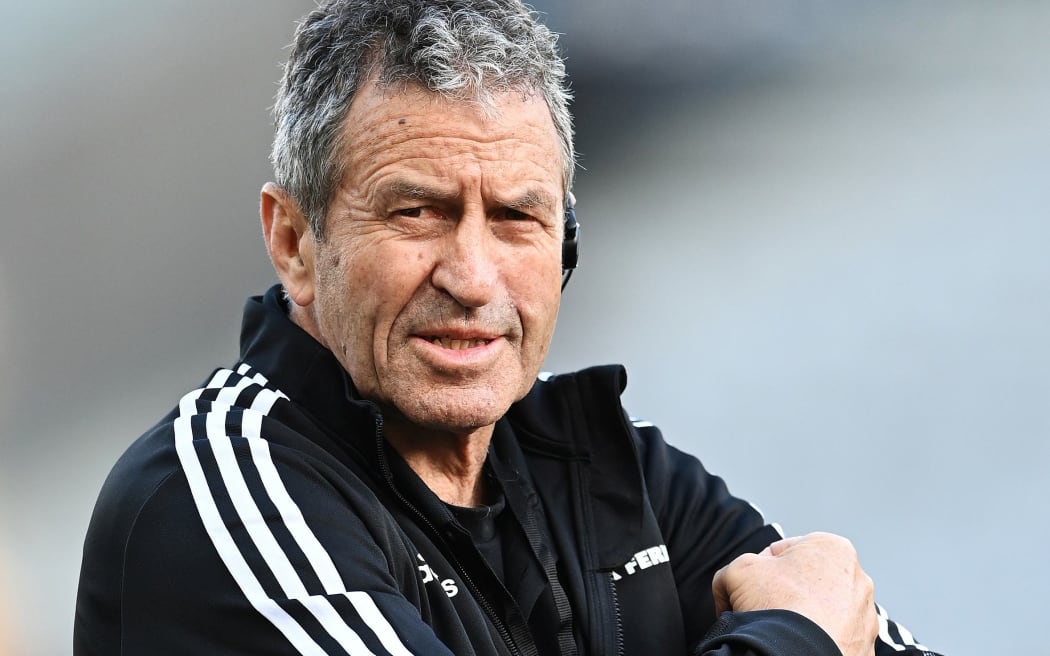Sir Wayne Smith took some convincing to write a memoir, but recently – over two months at his Waihi Beach bach – the legendary rugby mentor detailed his life to sportswriter Phil Gifford.
The resulting book Smithy: Endless Winters & The Spring of '22 is out now.

Black Ferns head coach Wayne Smith. Photo: Andrew Cornaga / www.photosport.nz
Smith is the only rugby coach to win three Rugby World Cups – two as an assistant coach for the All Blacks and one as head coach with the Black Ferns.
He talks to Kathryn Ryan about how his coaching style has developed over five decades.
Coaching the Black Ferns to a win at the 2022 Women's Rugby World Cup was one of the highlights of his life, Smith says.
"One thing that these women are superb at is work, and they are hugely dedicated to learning ... I was really hard on them. I'd give red cards, yellow cards, I'd send them around the post, I put them under pressure. They had to have coping strategies, stay in the present … you've got to replicate the pressures that they're going to get in the game and that's what we did."
Initially, this style of task-mastering created a bit of conflict with the players, though.
"We'd sit around the circle and I'd get feedback … and I couldn't handle that. But as we got through the weeks and the months, they became experts without even knowing. And eventually, when we played 15 minutes you couldn't tell what the starting 15 was as opposed to the non-starting 15 because they were that good. It was just dedicated intent, training and planning that created that."
Smith was in his early 20s when Laurie O'Reilly – a "great mate" and former New Zealand's Commissioner for Children – became his rugby coaching mentor.
"He rang me one day in about 1980 ... and asked me to come around for a chat about coaching. And I said 'I'm only 22' but he took me under his wing. His whole philosophy was the safest techniques are the most effective techniques. I grew up believing that - that if you teach safety, you're also teaching effectiveness. And it's something that's stayed with me all my life."
"Shaping the enemy" is also key to playing the game of rugby union, Smith says, and something he learnt about early on from Gary Hooper, a player with the Christchurch club Marist.
"I'd sort of been taught that, as a team, you've got to look at certain things in the opposition to determine what play you're going to make ... But whilst I thought I was making the play based on him, he was shaping me to make the play that he wanted me to make and then being in the right place to defuse it. [That was] a really great thing to learn from him early in my career as a player but also something I've taken into my coaching career."
Coaching in Italy in the '80s and '90s, he was exposed to a methodology of rugby coaching that involved creating game activities that put players in situations similar to what they'd have to deal with on the field.
"I noticed that it was creating better self-awareness in the players and they were, they're improving quicker."
In 1997, as the new coach of the Crusaders – his first major coaching role in Aotearoa – Smith's European-inspired training style came as "a bit of a surprise" to players who were used to coaches who were a bit more gruff and stern.
"I was pretty quiet, had different ideas, different ways of doing things. To be fair, it took a fair while for it to be accepted."
Smith says that growing up, he'd always been told that "the top three inches are what count" but had never been told how to make them count.
Over time, learning sports psychology techniques from mental skills coach and All Blacks manager Gilbert Enoka has helped him become more consistent as a coach.
While rugby players are often conditioned to avoid mistakes, Smith says that with a growth mindset, they're not something to fear.
"If you're not making mistakes, then it's not hard enough, it's not difficult enough. And you know, you're not going to beat the best countries in the world by going in with a mistake-free mentality."
In a game of rugby, complacency is your enemy, he says.
"Wise worry is a really good way to go into a game, you know. Don't be too worried. But you got to have some concern, some nervousness about the outcome, to really be on edge to play at your best."
Sports coaches should respect the players by taking their leadership role very seriously, Smith says.
"We expect our players to perform well and if they don't, they don't get selected. Ultimately, I really wanted to be that person that took responsibility."
Since Dave Gallaher (captain of the first-ever All Blacks team) first designed a position called wing forward, New Zealand rugby players have demonstrated a special talent for rapid reinvention and innovation, Smith says.
He also sees an "attacking mindset" in our DNA which the All Blacks should use to their advantage in the upcoming World Cup quarterfinal.
The team were "exhilaratingly good" in their 30 September game against Italy, he says.
"The All Blacks over the last period, whilst there have been some ups and downs when they've had to prove themselves and really play well, they've been able to front."

